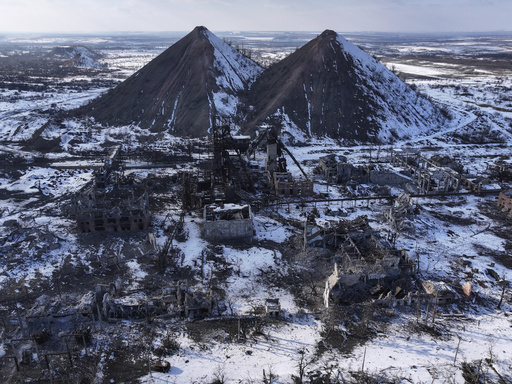KYIV, Ukraine — In what has been described as the largest coordinated drone assault of the ongoing conflict, Russian forces targeted Ukraine with an unprecedented number of strike drones overnight Saturday, according to Ukrainian President Volodymyr Zelenskyy. This event coincides with the impending three-year anniversary of Russia’s full-scale invasion, prompting significant concern from Ukrainian leaders.
On social media, Zelenskyy reported that 267 strike drones had been unleashed on Ukraine, marking a record attack since Iranian drones began their offensive operations in Ukrainian territories. The Ukrainian air defense successfully intercepted 138 of these drones across 13 different regions, while an additional 119 drones were reportedly lost before reaching their intended targets. The assault also included the launch of three ballistic missiles, one of which tragically resulted in a fatality in Kryvyi Rih, as detailed by the local military administration.
This escalation comes at a time when political leaders in Kyiv and across Europe are grappling with the rapid shifts in U.S. foreign policy under President Donald Trump. His new approach has raised alarms among Kyiv officials about potential changes in American support for Ukraine and how they may affect the ongoing conflict with Russia.
Trump’s recent interactions with Russian officials and his willingness to re-engage diplomatically with Moscow signify a stark departure from prior U.S. strategies that focused on isolating the Kremlin and Putin amidst the war. Zelenskyy has articulated concerns that a hurried resolution championed by Trump could lead to territorial losses for Ukraine and greater vulnerability to future Russian incursions, although U.S. officials have assured that Ukraine would have a role in any forthcoming peace negotiations.
The situation intensified further when Trump remarked that Ukraine had instigated the war while also criticizing Zelenskyy for perceived dictatorial actions during ongoing martial law that has stalled elections. Reacting to this critical stance, Ukraine’s Foreign Minister Andrii Sybiha stated that the overnight airstrikes demonstrate the undeniable truth of Russia being an aggressor, urging the international community not to take Putin’s rhetoric at face value while highlighting the need for action.
This Sunday, Zelenskyy, along with other governmental officials, is set to participate in a forum in Kyiv to review the country’s current state as the war approaches its three-year milestone. This forum holds particular significance as it occurs amid discussions around a proposal by Trump’s administration regarding Ukrainian rare earth minerals — a suggestion Zelenskyy previously turned down due to a lack of clear security assurances.
In his social media outreach, Zelenskyy emphasized the necessity for united efforts across international partners to secure a “lasting and just peace” for Ukraine, highlighting the importance of strong alliances with both Europe and the U.S.
On the Russian side, President Putin praised the efforts of Russian military personnel fighting in Ukraine during a special televised address coinciding with Russia’s Defender of the Fatherland Day. He used the occasion to promise enhanced social support for soldiers and emphasized ongoing commitments to upgrade military resources as part of Russia’s strategy to maintain national security.
In Europe, the UK announced plans to introduce new sanctions against Russia aimed at fortifying support for Ukraine. British Foreign Secretary David Lammy noted that these forthcoming measures would be the most substantial since the onset of the conflict and are designed to weaken Russia’s military capability while diminishing its capacity to prosecute the war.
As European leaders prepare for their trips to Washington, discussions are anticipated to focus on persuading Trump not to stray from supporting Ukraine in exchange for a peace agreement. British Prime Minister Keir Starmer urged that any talks regarding Ukraine must include the voices of Ukrainians, ensuring they have a long-term secure future amidst the turbulent geopolitical landscape.


